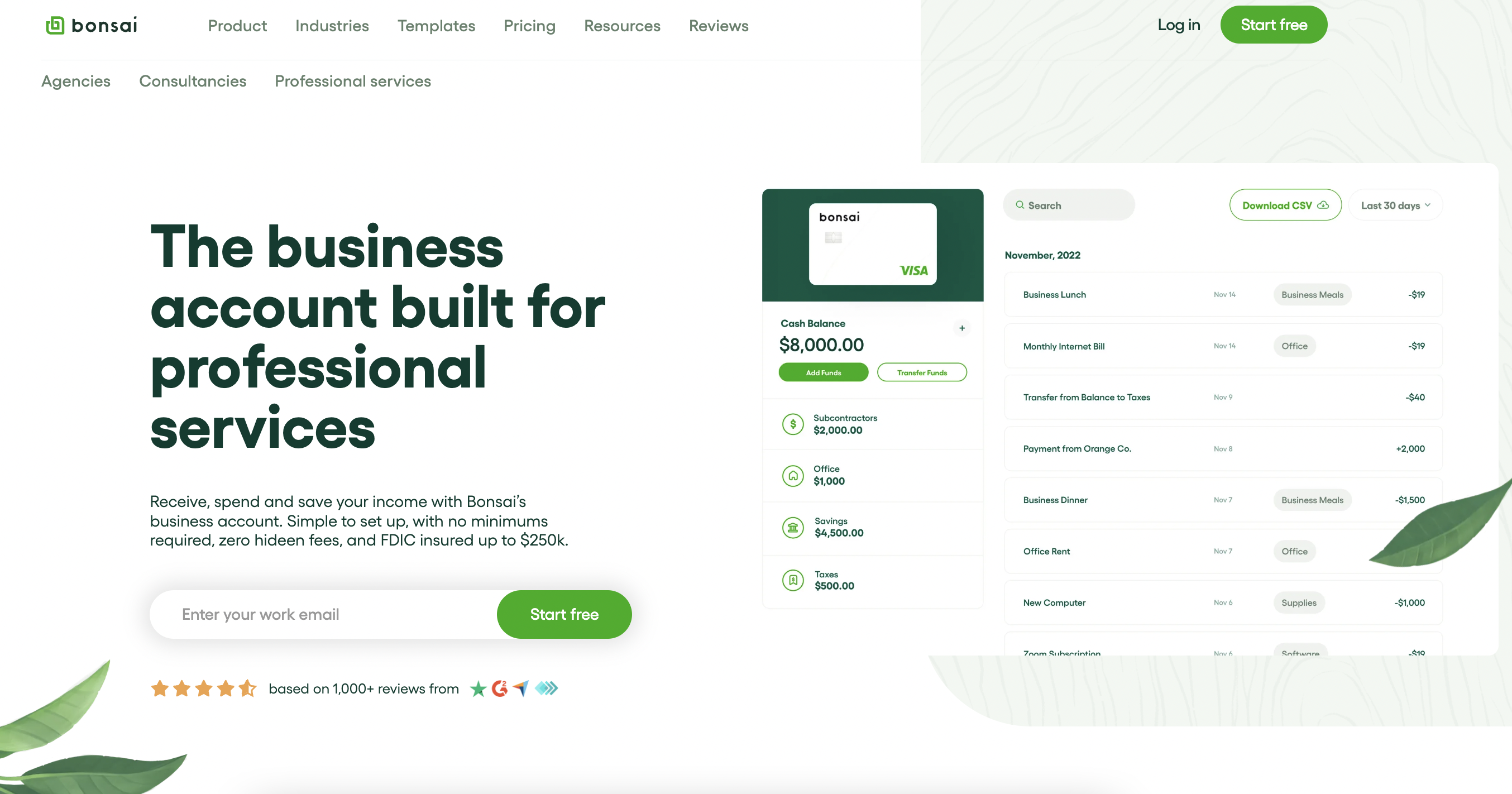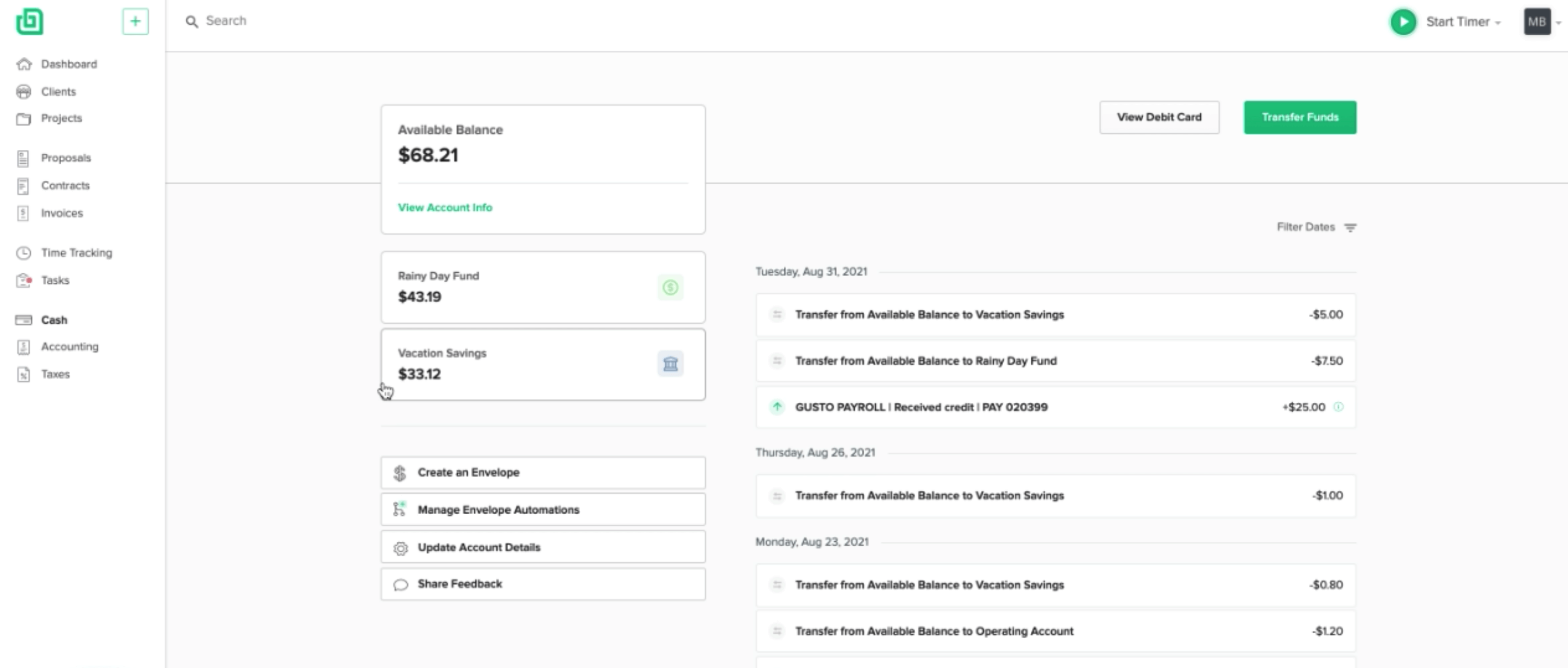Viele Kleinunternehmer nutzen nach wie vor ihre privaten Konten anstelle von Geschäftskonten, aber einige fragen sich unweigerlich: „Welches Problem lässt sich am besten mit einem Geschäftskonto lösen?“ Lohnt es sich, sich über Geschäftskonten bei den Finanzinstituten Ihrer Wahl zu informieren?
Als neuer Geschäftsinhaber möchten Sie vielleicht Ihre privaten und geschäftlichen Finanzen trennen und nach einer Privatkundenbank suchen, die Ihnen die besten Geschäftskonten anbieten kann.
Bevor Sie das tun, sollten Sie jedoch auch wissen, warum Sie ein solches Konto benötigen. Wenn du ein Geschäftskonto bei der richtigen Bank hast, kannst du viele Probleme lösen, die du sonst hättest. Lassen Sie uns herausfinden, warum.
Hinweis: Wenn Sie das beste Geschäftskonto ausprobieren und die Probleme lösen möchten, die gelöst werden könnten, probieren Sie das Geschäftskonto von Bonsai aus. Unser Geschäftskonto hat keine versteckten Gebühren oder monatlichen Mindestumsätze und ermöglicht es Ihnen, so viele Unterkonten zu erstellen, wie Sie benötigen. Kein Antragsverfahren und keine Bonitätsprüfung. Eröffnen Sie noch heute ein noch heute ein neues Konto.
Was ist ein Geschäftskonto?
Ein Geschäftskonto ist, wie der Name schon sagt, eine Art Bankkonto, das speziell auf die Bedürfnisse von Kleinunternehmern zugeschnitten ist. Dies kann ein Girokonto, ein Sparkonto, ein Händlerkonto oder eine Kreditkarte sein.
Geschäftskonten verfügen über verschiedene Funktionen, die Privatkonten möglicherweise nicht bieten. Beispielsweise können sie über Buchhaltungssoftware verfügen, die einem Technologieunternehmen dabei hilft, seine Finanzen im Blick zu behalten, oder sie können Unternehmenskredite für diejenigen bereitstellen, die eine Finanzierung benötigen.

Warum brauchen Unternehmen Geschäftsbanken?
In den meisten Fällen bieten fast alle Banken ein Geschäftskonto an, aber es kann auch einige Finanzinstitute geben, die dies nicht tun. Als Kleinunternehmer müssen Sie nach einer Bank suchen, die Unternehmen geeignete Investitionsmöglichkeiten bietet.
Eine Geschäftsbank bietet maßgeschneiderte Dienstleistungen, die genau auf die Bedürfnisse eines Unternehmens zugeschnitten sind und ein effizienteres Cashflow-Management ermöglichen. Einige Funktionen wie Girokonten und Sparkonten sind möglicherweise in beiden Fällen verfügbar, aber eine Geschäftsbank kümmert sich um Angelegenheiten wie Kreditkarten oder Geschäftstransaktionen.
Probleme, die eine Geschäftsbank lösen würde
Geschäftsbanken und die damit verbundenen Geschäftskonten können verschiedene Probleme lösen, darunter unter anderem:
Unprofessionelles Image
Wenn Sie kein Bankkonto für Ihr Kleinunternehmen haben und stattdessen Ihr Privatkonto verwenden, laufen Sie Gefahr, unprofessionell zu wirken. Wann immer Sie eine Zahlung tätigen oder erhalten, weiß die Person auf der anderen Seite, dass alles von einem persönlichen Konto kommt und dorthin zurückfließt.
Ein derart unprofessionelles Image kann auch die Unsicherheit der Kunden verstärken. Da sie kein Geschäftskonto sehen werden, werden sie glauben, dass Sie das Geschäft nur nebenbei betreiben, in der Regel als Nebentätigkeit. Wenn Sie hingegen wegen der Rentabilität der Banken ein Konto eröffnen möchten, werden diese wissen, dass Sie es ernst meinen. Mehr Professionalität ist einer der vielen Vorteile eines Geschäftskontos.
Schwierigkeiten beim Cash Management
Als neuer Kleinunternehmer haben Sie möglicherweise Schwierigkeiten, Ihre geschäftlichen und privaten Ausgaben voneinander zu trennen. Wenn Sie beispielsweise bei einem Technologieunternehmen arbeiten, müssen Sie Ihr Geld richtig organisieren und für Steuern, Ausrüstung, Abonnements und vieles mehr einplanen.
Wenn Sie nur Ihr persönliches Konto verwenden, geben Sie möglicherweise mehr für private Zwecke aus, als Sie sollten, sodass Ihre geschäftlichen Ausgaben nicht mehr gedeckt sind. Mit einem Geschäftskonto können Sie dies jedoch vermeiden.
Sie erhalten nicht nur Zugang zu einem separaten Geschäftskonto, sondern auch zu einer Vielzahl von geschäftsorientierten Funktionen für das Cash-Management.
Unser Freelancer-Geschäftskonto verfügt beispielsweise über eine Funktion namens „Umschläge“, mit der Sie Geld für verschiedene Sparziele einzahlen können. Es gibt keine wirkliche Begrenzung für diese Ausgaben, weshalb kleine Unternehmen diese Banken nutzen können, um sich selbst zu organisieren.
Persönliche Haftung
Viele Menschen nutzen einfach ihre alten Privatkonten, damit sie nicht mehr verschiedene Finanzinstitute durchsuchen und separate Konten eröffnen müssen. Das Problem ist, dass Sie sich bei Verwendung Ihres persönlichen Kontos persönlich für Probleme haftbar machen, die mit Ihrem Unternehmen auftreten.
Mit einem Bankkonto für kleine Unternehmen können Sie Ihre privaten Gelder von Ihren geschäftlichen Geldern trennen. Das bedeutet, dass selbst wenn Sie Schulden haben, diese nicht von Ihrem persönlichen Konto abgebucht werden – vor allem, weil nur das Geschäftskonto zur Verfügung steht, von dem abgebucht werden kann.
Kreditkartenzahlungen
Das Problem der Kreditkartenzahlungen lässt sich in der Regel am besten mit einem Geschäftskonto lösen. Privatkonten bei einer kleinen Bank im Bankensektor können Ihnen möglicherweise nicht viel helfen, da diese keine Kreditkarten oder Kreditlinien anbieten.
Allerdings bieten Banken, die sich an Unternehmen richten, in erster Linie die Möglichkeit der Kreditkartenzahlung an. Viele Kunden bevorzugen die Zahlung mit Kreditkarte. Wenn sie also sehen, dass ein Unternehmen keine Zahlungen mit Kreditkarte akzeptiert, suchen sie sich einfach ein anderes Geschäft.
Geschäftskonten lösen diese Probleme. Selbst wenn Sie sich für einfache Girokontodienste entscheiden, sollten Sie Kreditkartenzahlungen freischalten, wenn Sie ein registriertes Kleinunternehmen sind.
Schlechte Bonität
Wenn Sie eine schlechte Bonität für Ihr Unternehmen haben, wird Ihnen ein Privatkonto nicht viel helfen können. Eine Privatkundenbank hingegen wird Ihnen wahrscheinlich Kreditoptionen anbieten, wie beispielsweise eine Kreditlinie mit zugehörigen Kreditkarten.
Wenn Sie diese Kreditkarten verwenden und Ihre Schulden pünktlich bezahlen, verbessern Sie Ihre Beziehung zur Bank. Sie werden ihnen zeigen, dass Sie Ihre Zahlungen zuverlässig leisten und Ihre Schulden nicht in Verzug geraten lassen. Dies kann Ihnen helfen, einen besseren Zinssatz zu erhalten, wenn Sie einen Geschäftskredit suchen.
Wenn Sie eine schlechte Bonität haben, informieren Sie sich über unser Online-Geschäftskonto ohne Bonitätsprüfung.
Mangelnde Unternehmensfinanzierung
Kleine Unternehmen benötigen möglicherweise von Zeit zu Zeit Finanzmittel. Ohne Geschäftskonto erhalten Sie jedoch möglicherweise nur Zugang zu einem Privatkredit. Dies reicht möglicherweise nicht aus, um alle Ihre Ausgaben zu decken.
Andererseits können kleine Unternehmen, wenn sie sich für das beste Geschäftskonto entscheiden, eine Unternehmensfinanzierung erhalten. Außerdem hilft Ihnen dies nicht nur in finanzieller Hinsicht, sondern trägt auch zu einer besseren Beziehung zu Ihrer Bank bei.
Steuererklärung
Ein Geschäftskonto verfügt über eine Buchhaltungssoftware, die Ihnen bei der Steuererklärung helfen kann. Wenn Sie ein Privatkonto verwenden, vermischen sich Ihre privaten Finanzen mit Ihren geschäftlichen Finanzen. Bei der Steuererklärung kann dies zu großer Verwirrung führen.
Sie können einen Steuerberater beauftragen, Ihre Ausgaben zu trennen, aber selbst dieser weiß möglicherweise nicht genau, welche Transaktionen privat und welche geschäftlich waren. Auf diese Weise könnten Ihnen wichtige Abzüge entgehen.
Dieses Problem lässt sich am besten lösen, indem man ein separates Geschäftskonto eröffnet. Ihre Zahlungen werden nicht mehr verwechselt und es kommen keine Abzüge zu kurz. Wenn Sie beispielsweise ein Geschäftskonto bei Bonsai eröffnen, erhalten Sie auch Zugriff auf deren Steuererklärungssoftware.
Auf diese Weise werden Sie nicht bestraft, wenn Sie versuchen, etwas abzuziehen, was Sie nicht abziehen sollten. Auch Ihr Buchhalter wird sich freuen, da Sie ihm die Arbeit erleichtern.
Unternehmensgründung oder Personengesellschaft
Wenn Sie Ihr Unternehmen gründen oder eine Geschäftspartnerschaft eingehen, muss jemand die offiziellen Transaktionen für Ihr Unternehmen abwickeln. Das ist etwas, was man mit einem privaten Konto nicht machen kann, da es rechtliche Konsequenzen gibt, für die Sie aufkommen müssen.
Andererseits sollten Girokonten für kleine Unternehmen dieses Problem lösen können. Auf diese Weise wird Ihr Unternehmen als eigenständige juristische Person angesehen, und Sie können es problemlos gründen.

Probieren Sie das Geschäftskonto von Bonsai aus
Durch die Auswahl der besten Geschäftskonten lösen Sie verschiedene Probleme. Ihr Unternehmen wird nicht nur offiziell registriert, sondern Sie erhalten auch Zugang zu weiteren Finanzdienstleistungen, die Ihnen helfen können.
Wir empfehlen das beste Geschäftskonto, das Geschäftskonto von Bonsai. Keine versteckten Gebühren oder monatlichen Mindestanforderungen. Außerdem gibt es keinen Antrag, sodass es praktisch garantiert ist und Ihnen bei Ihrer schlechten Bonität helfen kann.

Unser Online-Geschäftskonto ist einfach einzurichten und ermöglicht es Ihnen, sofort Umschläge oder Unterkonten zu erstellen. Sie können ein Urlaubssparkonto oder einen Pensionsfonds einrichten und Geld automatisch dorthin überweisen lassen, wenn Sie Zahlungen erhalten.
Es gibt kein Antragsverfahren, daher sind unsere neuen Konten garantiert.
Recherchieren Sie Ihre Optionen, vergleichen Sie deren Merkmale und finden Sie dann die beste Bank für Ihre Zwecke.






